Creativity serves as a cornerstone in the realm of personal development, driving innovation, problem-solving, and cognitive growth. Its intricate interplay with individual growth processes is a subject of profound interest, shedding light on the transformative power it holds in shaping one's identity and skill set. By exploring the multifaceted dimensions of creativity in personal development, we uncover a tapestry of possibilities that not only enrich our lives but also propel us towards uncharted territories of self-discovery and fulfillment. The intricate dance between creativity and personal evolution unveils a narrative ripe with potential for exploration and insight, urging us to delve deeper into its enigmatic role in sculpting the human experience.
Key Takeaways
- Creativity ignites motivation and fosters fulfillment in personal development.
- Creative expression promotes emotional well-being and enhances problem-solving skills.
- Exploring unfamiliar territories creatively builds resilience and enhances problem-solving abilities.
- Embracing failure as a growth opportunity cultivates resilience and drives improvement in personal development.
Importance of Creativity in Personal Growth
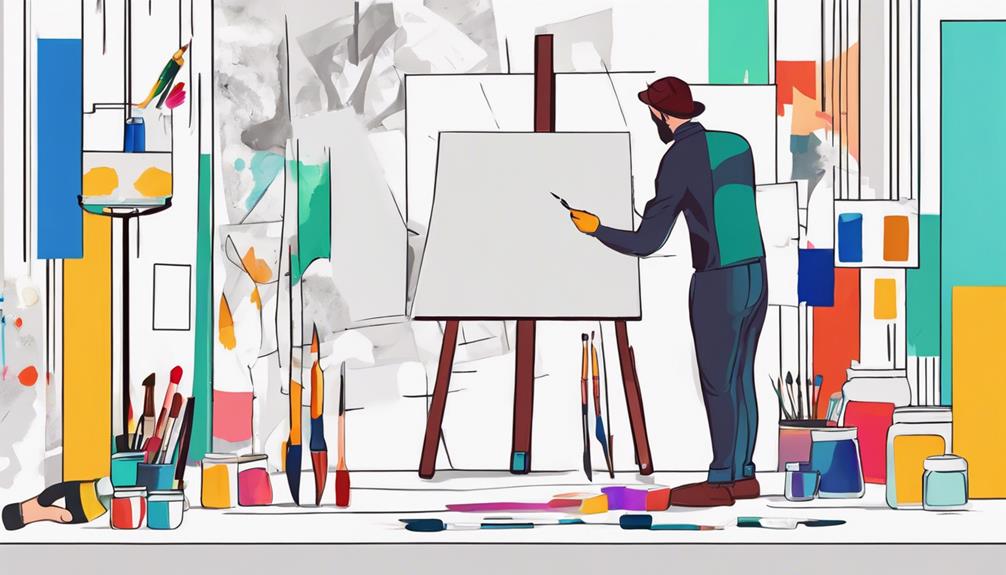
Creativity plays a pivotal role in fostering personal growth by igniting motivation and cultivating a deep interest in various activities. When individuals engage in creative pursuits, they are more likely to experience a sense of accomplishment and fulfillment, which are essential components of personal development. By challenging conventional thinking and exploring new ideas, creativity nurtures innovation and provides avenues for self-expression and exploration.
Moreover, creativity enhances personal growth by encouraging individuals to step out of their comfort zones and embrace new experiences. Through creative expression, individuals can discover hidden talents, develop problem-solving skills, and cultivate a mindset that is open to learning and adapting to change. This continuous process of self-improvement and adaptation is crucial for personal growth and development.
In essence, creativity serves as a catalyst for personal growth by inspiring individuals to push boundaries, think critically, and pursue their passions. It enables individuals to expand their horizons, gain new perspectives, and ultimately lead more fulfilling lives.
Benefits of Creative Expression
The exploration of creative expression reveals a myriad of benefits that contribute significantly to emotional well-being and cognitive development. Engaging in creative activities has been shown to promote emotional well-being by reducing stress levels. This reduction in stress can lead to improved mental health and overall quality of life. Additionally, participating in creative endeavors enhances problem-solving skills and critical thinking. Through the process of creating, individuals are required to think outside the box, consider multiple perspectives, and find innovative solutions, all of which are valuable skills in personal and professional growth.
Furthermore, creative expression fosters self-discovery and personal growth. By engaging in creative outlets, individuals can explore their thoughts, feelings, and beliefs, leading to a better understanding of themselves and their place in the world. This process of self-discovery can be transformative, leading to increased self-awareness and personal development. Moreover, creative activities provide a means for processing and expressing complex emotions, allowing individuals to communicate and cope with their feelings in a healthy and constructive manner. Ultimately, participating in creative endeavors can boost self-esteem and confidence levels, empowering individuals to embrace new challenges and opportunities for growth.
Embracing Curiosity for Personal Development
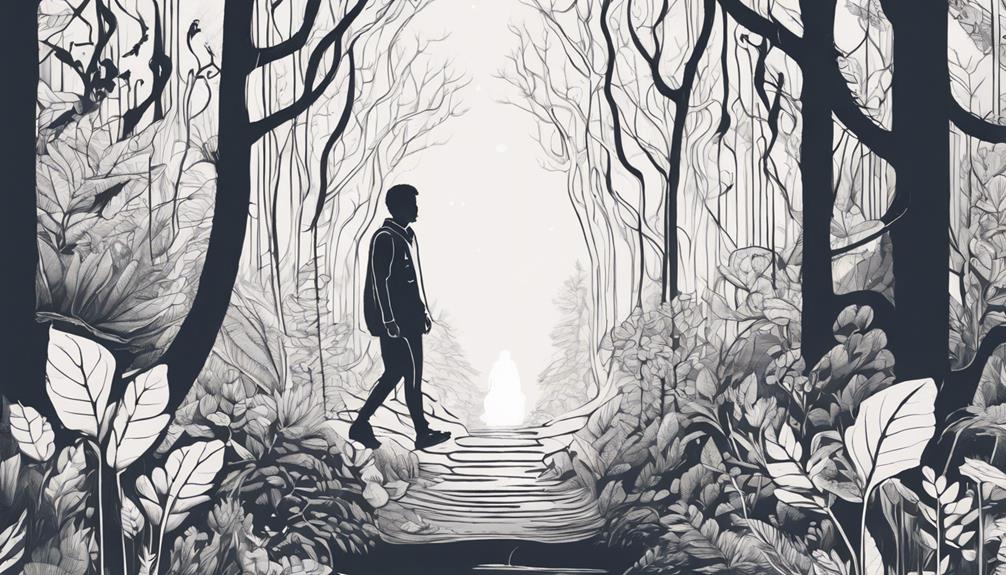
Embracing a mindset of curiosity plays a pivotal role in fostering personal development by igniting a thirst for knowledge and exploration. Curiosity serves as a catalyst for growth, pushing individuals to seek new experiences, ideas, and perspectives. By being curious, individuals are more inclined to challenge themselves, step out of their comfort zones, and embrace the unknown. This willingness to explore the unfamiliar not only broadens one's horizons but also cultivates creativity and innovation.
Curiosity fuels a sense of wonder and inquiry, prompting individuals to ask questions, seek answers, and engage in continuous learning. It encourages individuals to delve deeper into subjects, uncover underlying connections, and discover hidden potentials within themselves. By nurturing a curious mindset, individuals can unlock new opportunities for personal and professional development.
In essence, curiosity acts as a driving force for personal growth, enabling individuals to expand their knowledge, skills, and perspectives. It is through curiosity that individuals embark on a journey of self-discovery and transformation, leading to a more fulfilling and enriched life.
Journaling for Reflection and Growth
Utilizing journaling as a structured method for introspection and analysis supports individuals in fostering self-awareness and promoting personal growth. Journaling serves as a powerful tool that aids in personal development by allowing individuals to reflect on their thoughts, emotions, and experiences. Through the act of writing regularly in a journal, one can enhance their creativity, problem-solving skills, and gain a deeper understanding of themselves. Here are three key ways in which journaling contributes to personal growth and development:
- Facilitating Self-Reflection: Journaling provides a structured platform for individuals to explore their inner thoughts and experiences, enabling them to identify patterns in their behavior and emotions.
- Enhancing Self-Awareness: By tracking progress, setting goals, and gaining insights into their inner workings, individuals can improve emotional intelligence, mindfulness, and self-awareness through journaling.
- Boosting Creativity: Journaling fosters artistic expression, cultivates creativity, and helps individuals solve problems by allowing them to continuously learn and try new things.
Stepping Out of Comfort Zones Creatively
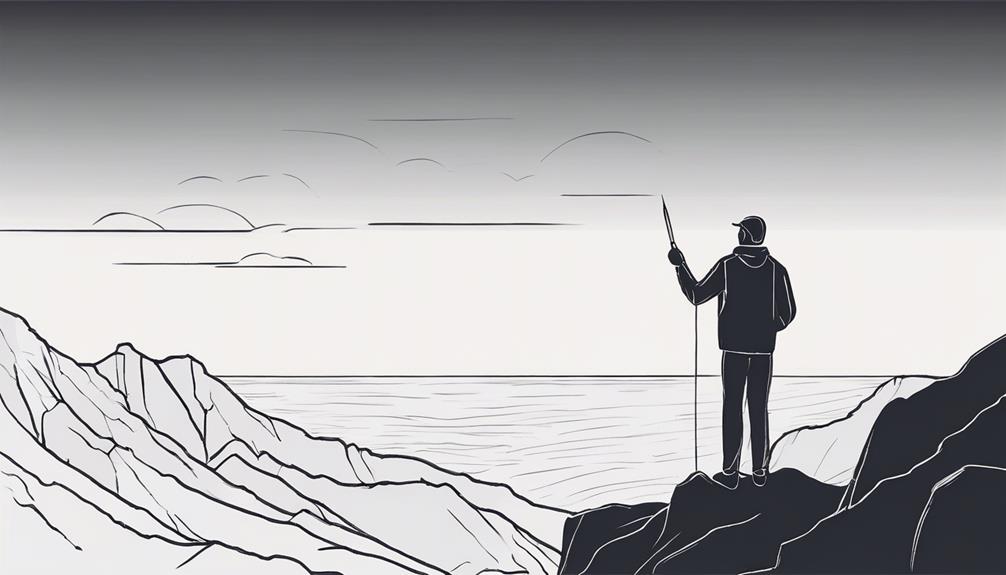
Stepping out of comfort zones creatively involves actively seeking challenges and embracing new experiences in a creative manner. By pushing boundaries with creativity, individuals can cultivate adaptability and resilience, essential qualities for personal development. Exploring unfamiliar territories creatively can unlock innovative solutions and foster a mindset geared towards growth and self-improvement.
Embracing New Challenges Creatively
How can individuals effectively navigate unfamiliar territories to foster personal growth and resilience through creative exploration? Stepping out of comfort zones creatively is key. Here's how:
- Expand Horizons: Embracing new challenges creatively opens doors to uncharted territories, broadening perspectives and knowledge.
- Build Resilience: Creative approaches to unfamiliar situations cultivate adaptability, enhancing the ability to bounce back from setbacks and thrive in adversity.
- Enhance Problem-Solving: Creatively exploring new opportunities sharpens problem-solving skills and fosters innovative thinking, enabling individuals to tackle challenges with creativity and confidence.
Pushing Boundaries With Creativity
Exploring uncharted territories through creative endeavors serves as a catalyst for personal growth and resilience, pushing individuals to confront discomfort and embrace new challenges head-on. Creative experimentation involves stepping out of comfort zones, which fosters personal development by expanding experiences and perspectives. By challenging self-imposed limitations through creative exploration of unfamiliar territories, individuals cultivate adaptability and enhance problem-solving skills. Trying new creative activities outside of routine not only boosts confidence but also increases resilience in facing challenges. Embracing discomfort through creative endeavors leads to heightened self-awareness and skill development, contributing to overall growth. Pushing boundaries with creativity plays a crucial role in promoting innovation and fostering a mindset geared towards continuous personal development.
Exploring Unfamiliar Territories Creatively
Engaging in creative pursuits that challenge familiarity can significantly enhance personal growth and adaptability. Creative exploration of unfamiliar territories offers numerous benefits:
- Resilience Building: Stepping out of comfort zones creatively promotes resilience by exposing individuals to new challenges and helping them develop coping strategies.
- Enhanced Problem-Solving: Creative approaches to exploring unfamiliar territories encourage individuals to think outside the box, leading to improved problem-solving skills and innovative solutions.
- Embracing Change: Venturing into unknown realms creatively fosters a mindset open to change, enabling individuals to adapt more easily to new situations and embrace opportunities for personal development.
Surrounding Yourself With Inspiration
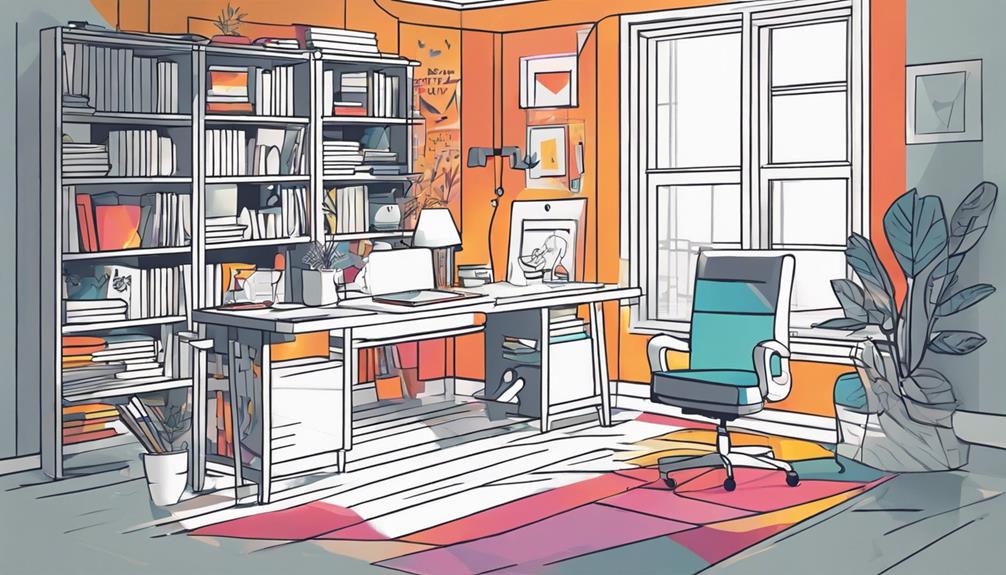
Indulging in diverse sources of inspiration, whether from art, nature, or creative works, plays a pivotal role in stimulating creative thinking for personal development. Exposure to artistic inspiration can ignite novel ideas and perspectives, fostering innovation and originality. By immersing oneself in environments teeming with creativity, individuals can enhance motivation and spark new concepts. Engaging with different forms of inspiration cultivates a mindset that is receptive to creative exploration and growth. The multifaceted nature of inspiration from various sources not only fuels passion but also instills a drive to pursue personal development goals with vigor.
Artistic inspiration, in particular, has the power to transcend conventional thinking and propel individuals towards unconventional solutions. It encourages individuals to think outside the box, pushing boundaries and challenging norms. Surrounding oneself with artistic stimuli cultivates a sense of wonder and curiosity, essential components in the journey of personal development. Overall, embracing inspiration from diverse sources sets the stage for a dynamic and enriching creative process that propels individuals towards greater self-discovery and achievement.
Mindfulness Practices for Creativity
In the realm of personal development, incorporating mindfulness practices is paramount for nurturing creativity and enhancing cognitive processes. Creative mindfulness involves engaging in activities that promote awareness of the present moment, allowing individuals to harness their creative potential more effectively. Here are key ways in which mindfulness practices can facilitate creativity:
- Calming the Mind: Techniques like meditation and deep breathing can help quiet the mental chatter and distractions, creating a space for innovative ideas to emerge.
- Enhancing Focus: By encouraging individuals to be fully present in their activities, mindfulness enables them to channel their attention towards creative endeavors with greater clarity and purpose.
- Stimulating Creative Thinking: Activities such as yoga or nature walks not only promote relaxation but also stimulate the brain, fostering creative thinking and problem-solving skills.
Embracing Failure as Growth Opportunity
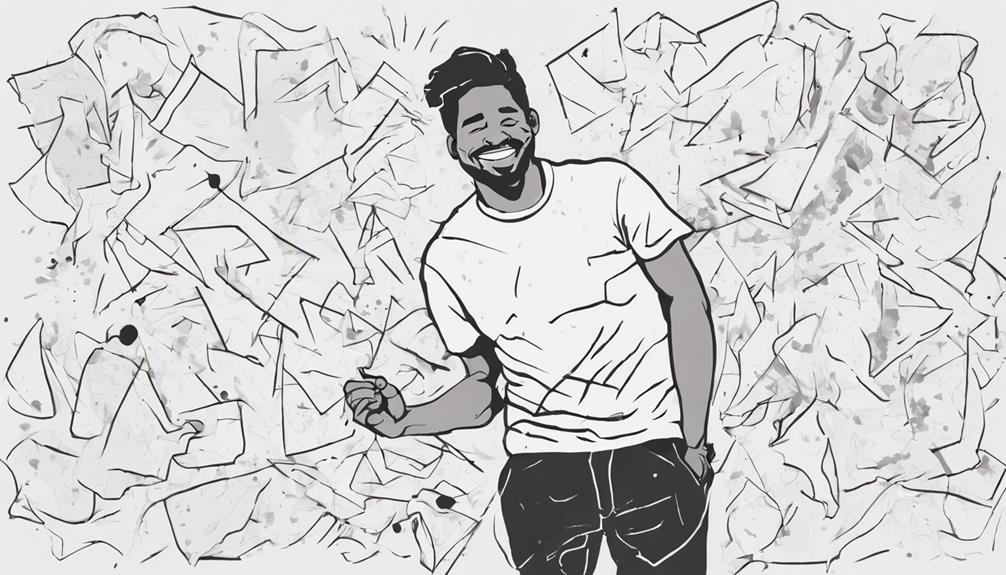
Embracing failure as a growth opportunity is essential for personal development as it cultivates resilience and adaptability. Learning from mistakes and overcoming setbacks provide valuable insights that drive improvement and innovation. By viewing failure as a natural part of the creative process, individuals can harness its potential to lead to breakthroughs and new perspectives.
Learning From Mistakes
Learning from mistakes is a fundamental aspect of personal growth and development, providing valuable opportunities for self-improvement and innovation.
Key Points:
- Insights and Feedback: Embracing failure as a growth opportunity allows individuals to glean valuable feedback and insights, fostering improved problem-solving skills.
- Resilience and Positive Mindset: Viewing mistakes as stepping stones to success promotes resilience and a positive mindset towards overcoming challenges.
- Self-Reflection and Improvement: Embracing failure as a learning experience encourages self-reflection and continuous improvement, leading to enhanced personal development.
Overcoming Setbacks
Overcoming setbacks is a pivotal process in personal development, catalyzing growth through the transformation of failures into opportunities for advancement and resilience. Embracing failure as a growth opportunity fosters creative resilience, enabling individuals to bounce back stronger and more determined. By learning from setbacks, individuals can refine their skills, adapt strategies, and cultivate a mindset that embraces challenges as stepping stones to success. Failure offers valuable lessons and insights that can lead to innovative solutions and personal growth. Creative resilience encourages a positive outlook, a willingness to take risks, and a continuous pursuit of improvement. Viewing setbacks as temporary obstacles rather than insurmountable barriers empowers individuals to persevere, innovate, and thrive in the face of adversity.
Cultivating a Growth Mindset Through Creativity
Cultivation of a growth mindset through creativity involves a fundamental shift in perception towards challenges as opportunities for advancement and learning. Creative problem solving plays a crucial role in this process by enabling individuals to approach difficulties with innovative solutions and a positive mindset. To foster a growth mindset through creativity, individuals can:
- Embrace Challenges: Creativity allows individuals to tackle challenges with a fresh perspective, viewing them as opportunities to learn and grow rather than insurmountable obstacles.
- Learn from Setbacks: Creative thinking helps individuals reframe setbacks as valuable learning experiences, motivating them to persist and find alternative solutions.
- See Failures as Stepping Stones: By embracing creativity, individuals are encouraged to see failures not as dead-ends but as essential steps towards improvement and eventual success.
Seeking Feedback and Collaboration for Personal Growth
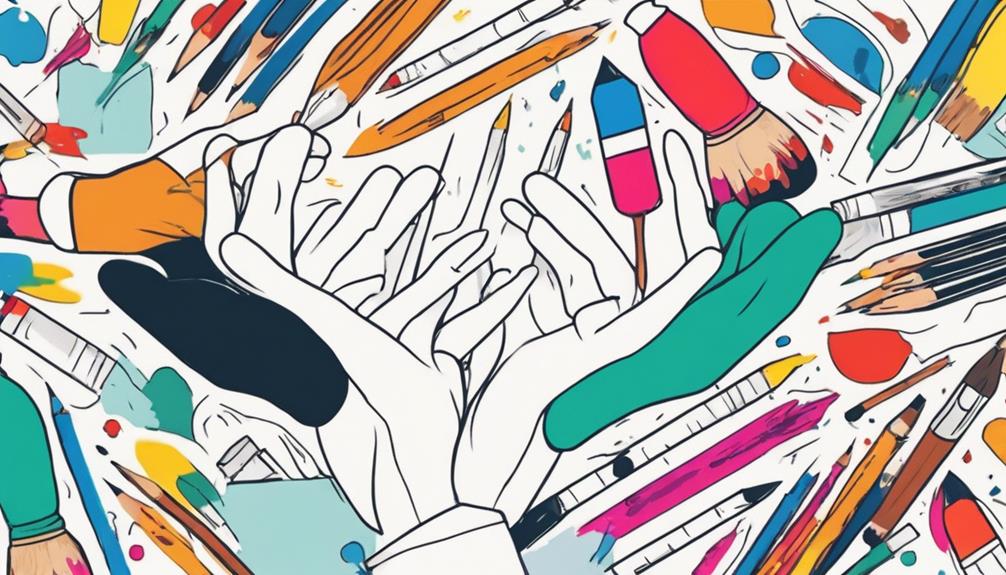
Effective personal development often involves seeking feedback and engaging in collaborative efforts to enhance one's creative endeavors and foster continuous growth. Seeking feedback from others provides valuable insights and different perspectives on one's work, enabling individuals to identify areas for improvement and refine their creative projects. Collaborating with peers facilitates the exchange of ideas, leading to a more comprehensive understanding of creative endeavors and promoting a sense of community and mutual support in the creative process.
| Benefits of Seeking Feedback and Collaboration | |
|---|---|
| Gain new perspectives on work | Exchange ideas with peers |
| Identify areas for improvement | Foster a sense of community |
| Refine work for enhanced quality | Promote mutual support |
| Enhance overall creativity | Catalyze personal growth and continuous learning |
Constructive feedback acts as a catalyst for personal growth by enabling individuals to iterate on their work through a feedback loop, continuously improving and striving for excellence in their creative pursuits. Embracing feedback and collaboration not only refines one's creative output but also nurtures a mindset of continuous learning and development in personal and professional spheres.
Frequently Asked Questions
Why Creativity Is an Important Part of a Person's Life?
Creativity is a crucial aspect of a person's life due to its profound impact on wellness. It serves as a gateway to innovative problem-solving, fostering adaptability and resilience in individuals. By engaging in creative endeavors, individuals stimulate cognitive processes, enhancing mental acuity and emotional well-being. The exploration of one's creative potential not only enriches personal experiences but also promotes holistic growth, contributing significantly to overall wellness and life satisfaction.
What Is the Role of Creativity in Personal Effectiveness?
Creative problem solving plays a pivotal role in personal effectiveness. Through innovative thinking and unique approaches, individuals can tackle challenges with agility and resourcefulness. Creativity enables individuals to navigate complex situations, adapt to change, and find unconventional solutions. By incorporating creativity into personal development, individuals can enhance their problem-solving skills, increase their adaptability, and ultimately improve their overall effectiveness in various aspects of life.
What Is Creativity in Human Development?
Creative expression in human development refers to the unique ability to generate original ideas and solutions. It is a fundamental aspect that fosters innovation, problem-solving skills, and critical thinking. Creativity plays a crucial role in personal growth, self-expression, and exploring diverse perspectives. Engaging in creative activities enhances cognitive development, adaptability, and resilience, contributing significantly to an individual's overall development and well-being.
Why Is Creativity an Important Life Skill?
Creative problem-solving is an essential life skill due to its ability to drive innovation and overcome challenges through unique approaches. By fostering creativity, individuals can navigate complex situations with adaptability and originality, leading to successful outcomes and personal growth. This skill encourages thinking outside conventional boundaries, promoting ingenuity and resourcefulness in various aspects of life. Embracing creativity equips individuals with the tools to tackle obstacles creatively and achieve sustainable solutions.
Conclusion
In conclusion, the role of creativity in personal development is paramount, as it fosters independent thought, problem-solving skills, and effective talent utilization. Embracing curiosity, journaling for reflection, stepping out of comfort zones, and mindfulness practices all contribute to personal growth. Cultivating a growth mindset through creativity, embracing failure as a growth opportunity, and seeking feedback and collaboration are essential for continuous development. Creativity is a powerful driver for both personal and professional growth, enhancing cognitive skills and adaptability.
